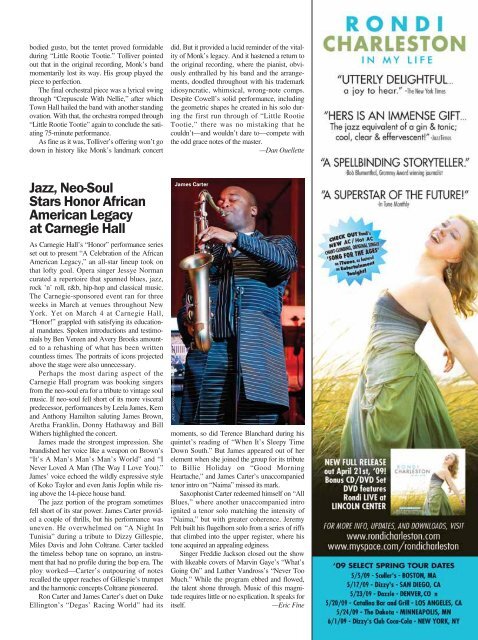You also want an ePaper? Increase the reach of your titles
YUMPU automatically turns print PDFs into web optimized ePapers that Google loves.
odied gusto, but the tentet proved formidable<br />
during “Little Rootie Tootie.” Tolliver pointed<br />
out that in the original recording, Monk’s band<br />
momentarily lost its way. His group played the<br />
piece to perfection.<br />
The final orchestral piece was a lyrical swing<br />
through “Crepuscule With Nellie,” after which<br />
Town Hall hailed the band with another standing<br />
ovation. With that, the orchestra romped through<br />
“Little Rootie Tootie” again to conclude the satiating<br />
75-minute performance.<br />
As fine as it was, Tolliver’s offering won’t go<br />
down in history like Monk’s landmark concert<br />
did. But it provided a lucid reminder of the vitality<br />
of Monk’s legacy. And it hastened a return to<br />
the original recording, where the pianist, obviously<br />
enthralled by his band and the arrangements,<br />
doodled throughout with his trademark<br />
idiosyncratic, whimsical, wrong-note comps.<br />
Despite Cowell’s solid performance, including<br />
the geometric shapes he created in his solo during<br />
the first run through of “Little Rootie<br />
Tootie,” there was no mistaking that he<br />
couldn’t—and wouldn’t dare to—compete with<br />
the odd grace notes of the master.<br />
—Dan Ouellette<br />
Jazz, Neo-Soul<br />
Stars Honor African<br />
American Legacy<br />
at Carnegie Hall<br />
As Carnegie Hall’s “Honor” performance series<br />
set out to present “A Celebration of the African<br />
American Legacy,” an all-star lineup took on<br />
that lofty goal. Opera singer Jessye Norman<br />
curated a repertoire that spanned blues, jazz,<br />
rock ’n’ roll, r&b, hip-hop and classical music.<br />
The Carnegie-sponsored event ran for three<br />
weeks in March at venues throughout New<br />
York. Yet on March 4 at Carnegie Hall,<br />
“Honor!” grappled with satisfying its educational<br />
mandates. Spoken introductions and testimonials<br />
by Ben Vereen and Avery Brooks amounted<br />
to a rehashing of what has been written<br />
countless times. The portraits of icons projected<br />
above the stage were also unnecessary.<br />
Perhaps the most daring aspect of the<br />
Carnegie Hall program was booking singers<br />
from the neo-soul era for a tribute to vintage soul<br />
music. If neo-soul fell short of its more visceral<br />
predecessor, performances by Leela James, Kem<br />
and Anthony Hamilton saluting James Brown,<br />
Aretha Franklin, Donny Hathaway and Bill<br />
Withers highlighted the concert.<br />
James made the strongest impression. She<br />
brandished her voice like a weapon on Brown’s<br />
“It’s A Man’s Man’s Man’s World” and “I<br />
Never Loved A Man (The Way I Love You).”<br />
James’ voice echoed the wildly expressive style<br />
of Koko Taylor and even Janis Joplin while rising<br />
above the 14-piece house band.<br />
The jazz portion of the program sometimes<br />
fell short of its star power. James Carter provided<br />
a couple of thrills, but his performance was<br />
uneven. He overwhelmed on “A Night In<br />
Tunisia” during a tribute to Dizzy Gillespie,<br />
Miles Davis and John Coltrane. Carter tackled<br />
the timeless bebop tune on soprano, an instrument<br />
that had no profile during the bop era. The<br />
ploy worked—Carter’s outpouring of notes<br />
recalled the upper reaches of Gillespie’s trumpet<br />
and the harmonic concepts Coltrane pioneered.<br />
Ron Carter and James Carter’s duet on Duke<br />
Ellington’s “Degas’ Racing World” had its<br />
JACK VARTOOGIAN/FRONTROWPHOTOS<br />
James Carter<br />
moments, so did Terence Blanchard during his<br />
quintet’s reading of “When It’s Sleepy Time<br />
Down South.” But James appeared out of her<br />
element when she joined the group for its tribute<br />
to Billie Holiday on “Good Morning<br />
Heartache,” and James Carter’s unaccompanied<br />
tenor intro on “Naima” missed its mark.<br />
Saxophonist Carter redeemed himself on “All<br />
Blues,” where another unaccompanied intro<br />
ignited a tenor solo matching the intensity of<br />
“Naima,” but with greater coherence. Jeremy<br />
Pelt built his flugelhorn solo from a series of riffs<br />
that climbed into the upper register, where his<br />
tone acquired an appealing edginess.<br />
Singer Freddie Jackson closed out the show<br />
with likeable covers of Marvin Gaye’s “What’s<br />
Going On” and Luther Vandross’s “Never Too<br />
Much.” While the program ebbed and flowed,<br />
the talent shone through. Music of this magnitude<br />
requires little or no explication. It speaks for<br />
itself.<br />
—Eric Fine
















